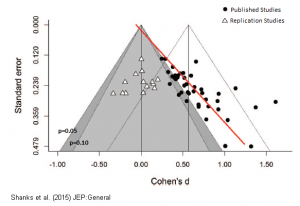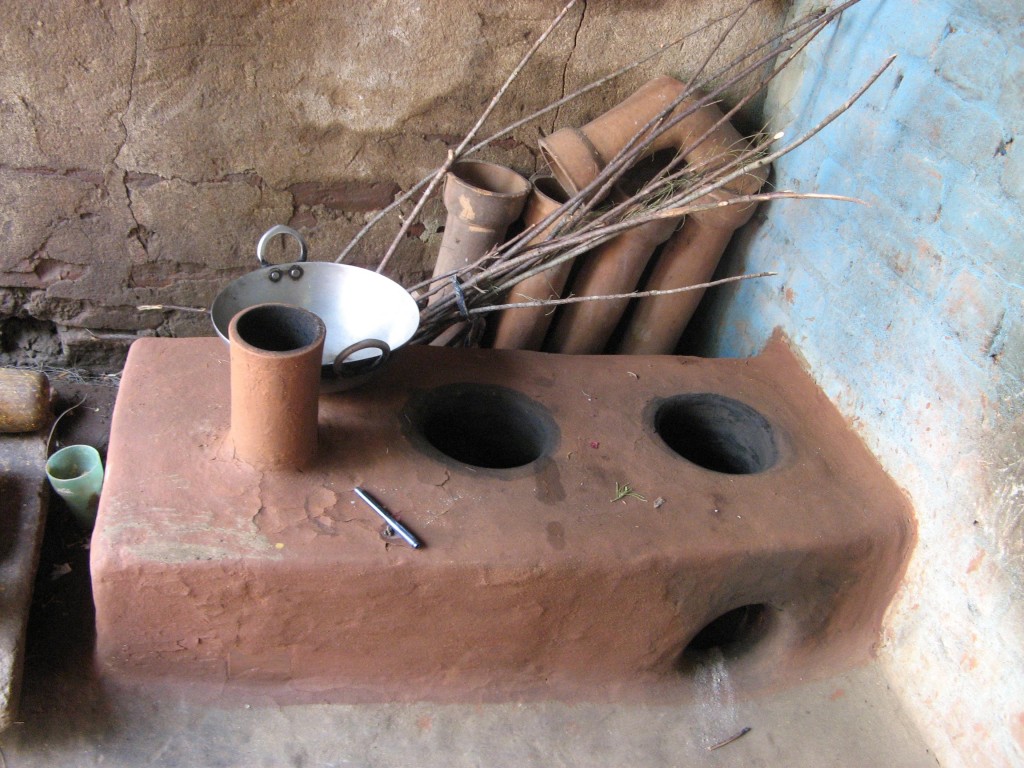Guest post by Jeff Mosenkis of Innovations for Poverty Action.
- Remember David Evans, the guy nominated for a best writing on the internet award for his research summaries? He’s back from the NUEDC conference with one-sentence summaries of 150 papers, cataloged by country, method, and topic.
- In the Washington Post, Marc Gunther asks “These cheap, clean stoves were supposed to save millions of lives. What happened?” The most succinct answer comes from Kevin Starr, director of the Mulago Foundation: “The affordable ones are inadequate, and the good ones are unaffordable.”
 In research transparency news, a new psych paper published a “smoking gun” detecting p-hacking or selective publication. The authors examine the finding that romantic “priming” can induce higher spending and risk-taking. In this figure, they plot effect size vs. standard errors plot of published vs. attempts to replicate the finding. The published ones all shifted right (larger effect-larger std error), and line up closely along the .05 threshold of statistical significance. (For slow people like me, here’s a more detailed discussion of how to read it from IPA-Ghana’s Nate Barker). via Neuroskeptic.
In research transparency news, a new psych paper published a “smoking gun” detecting p-hacking or selective publication. The authors examine the finding that romantic “priming” can induce higher spending and risk-taking. In this figure, they plot effect size vs. standard errors plot of published vs. attempts to replicate the finding. The published ones all shifted right (larger effect-larger std error), and line up closely along the .05 threshold of statistical significance. (For slow people like me, here’s a more detailed discussion of how to read it from IPA-Ghana’s Nate Barker). via Neuroskeptic.- So how to know what studies will replicate? In PNAS researchers used prediction markets, where other researchers were given $100 to invest in “stocks” representing individual studies to be replicated (or not), and they predicted correctly 71 percent of the time. Summary in the Atlantic.
- Priceonomics has a fun piece on the origins of statistical regression and 19th Century battle for credit between two famous mathematicians. (Imagine a super formal rap battle).
- A bleg: For upcoming holiday travel we’re looking to compile a playlist of good podcast epsiodes around economics, development, and the like, which we’ll post. Feel free to put suggestions in the comments.
And, a story of welfare incentives. A panda in a Taiwanese zoo seems to have faked pregnancy to get better treatment (air conditioning and better food).



15 Responses
RT @poverty_action: Links: @marcgunther What happened to cookstoves that were supposed to save millions of lives?https://t.co/mOm2zwvFPc ht…
RT @poverty_action: Links: @marcgunther What happened to cookstoves that were supposed to save millions of lives?https://t.co/mOm2zwvFPc ht…
RT @poverty_action: Links: @marcgunther What happened to cookstoves that were supposed to save millions of lives?https://t.co/mOm2zwvFPc ht…
RT @poverty_action: Links: @marcgunther What happened to cookstoves that were supposed to save millions of lives?https://t.co/mOm2zwvFPc ht…
RT @poverty_action: Links: @marcgunther What happened to cookstoves that were supposed to save millions of lives?https://t.co/mOm2zwvFPc ht…
Links: @marcgunther What happened to cookstoves that were supposed to save millions of lives?https://t.co/mOm2zwvFPc https://t.co/G5Fmu7o2xl
RT @poverty_action: Links w/ @cblatts- https://t.co/mOm2zwvFPc @tukopamoja w/150 one-sentence paper summaries & panda welfare scams! https:…
RT @poverty_action: Links w/ @cblatts- https://t.co/mOm2zwvFPc @tukopamoja w/150 one-sentence paper summaries & panda welfare scams! https:…
Links w/ @cblatts- https://t.co/mOm2zwvFPc @tukopamoja w/150 one-sentence paper summaries & panda welfare scams! https://t.co/dpiMp5aj4p
RT @poverty_action: In the links w/@cblatts the real secret of the pyramids that detect publication bias https://t.co/mOm2zwvFPc https://t…
IPA’s weekly links https://t.co/n0X63yeCUm
RT @poverty_action: In the links w/@cblatts the real secret of the pyramids that detect publication bias https://t.co/mOm2zwvFPc https://t…
RT @poverty_action: In the links w/@cblatts the real secret of the pyramids that detect publication bias https://t.co/mOm2zwvFPc https://t…
In the links w/@cblatts the real secret of the pyramids that detect publication bias https://t.co/mOm2zwvFPc https://t.co/NcmnUFOAdK
IPA’s weekly links: Guest post by Jeff Mosenkis of Innovations for Poverty Action. Remember David Evans, the g… https://t.co/ycSoCfJLgd